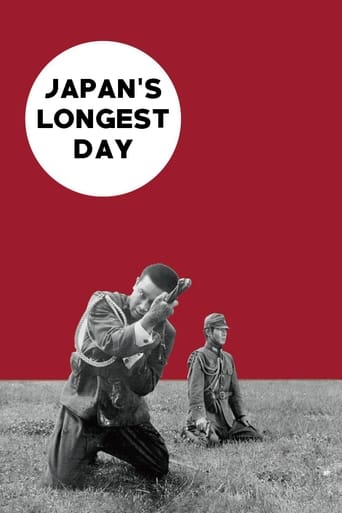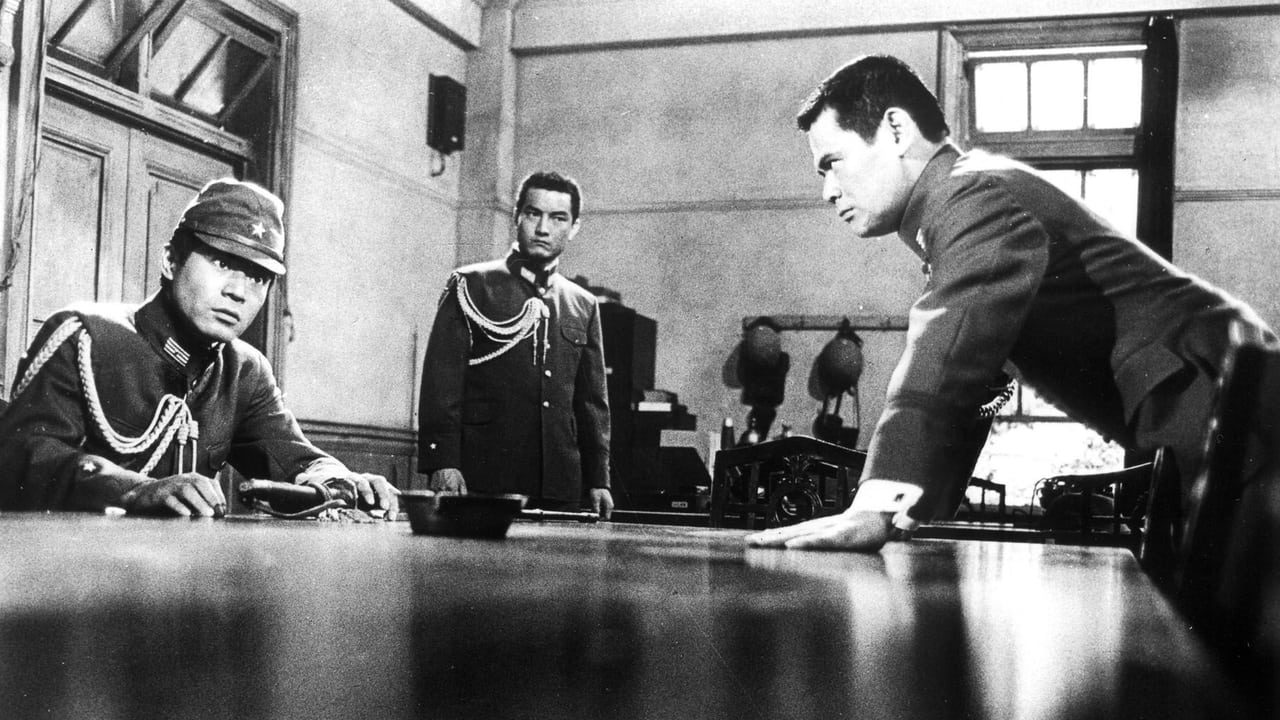trevillian2
First off I would say you will want to watch this movie more than once for a couple of reasons. Main one for me is in reading the sub-titles etc. I missed out on a lot of the action and byplay of the various actors. Unless you are fluent in Japanese, you have to read to follow the plots, of which there are many. The subtitles pass so quickly that I was just getting the gist of the dialog in some spots, so I will need to watch again now that I have it down fairly well. There are so many roles to follow and all of them are interesting, so you don't want to let anyone fall away as he returns later in the film and you will want to remember what he was doing earlier in the movie. All are based on real people of the times, and very real events. As the story progresses I was caught up in the increasing action and urgency of the rebellion. The young officer who is so deeply involved and is such a zealot for the army continuing to fight is truly frightening as you can see some of this rabid resolve right now in some of these Jihad warriors in the mid-east. Just goes to show that Berserkers are not only from the days of Viking raiders. By the way this movie is not suitable for young viewers, it is matter of fact, but graphic in various death scenes.
David Conrad
By mid-August 1945 Japan's leaders knew that defeat in the "Greater East Asia War" was inevitable. The fire-bombings of Tokyo, the deployment of atomic bombs against Hiroshima and Nagasaki, and the Soviet Union's entry into the war against Japan underscored this reality. Yet there were two major impediments to Japan's surrender: bureaucratic paralysis and a looming coup attempt from within the armed forces. The first half of Japan's Longest Day chronicles the first of these obstacles with a high degree of historical accuracy (compare with Tsuyoshi Hasegawa's non-fiction book "Racing the Enemy," published in 2005). Chishu Ryu, Toshiro Mifune, and Takashi Shimura, familiar faces from many Yasujiro Ozu and Akira Kurosawa movies, portray members of Japan's divided cabinet with dignity and gravitas. Unfortunately, the second half of the movie unfolds more slowly than the first despite a great deal of shouting and violence during the coup attempt, and the script makes little attempt to situate the would-be army revolt in a philosophical or historical context. The film's final moments slip even further into myopia: Japan's military and civilian deaths are tallied, but no mention is made of the millions of deaths inflicted by Japan's armed forces in Asia. Despite these shortcomings, Japan's Longest Day is well worth watching for those with an interest in Japanese cinema or the end of World War II in the Pacific.
MartinHafer
This is an interesting historical piece. It's the recreation of the last day of Japan before they announced their surrender to Allied forces on 8/15/45. And, it plays like a docudrama--with great attention to detail.The film is quite unusual in that the title credits for "Nihon No Ichiban Nagai Hi" do not appear until 21 minutes into the film. The time before this all is a condensation of the events in the final weeks of the war--the Potsdam ultimatum, the entry of the Soviet Union into the Pacific war and the use of the two atomic bombs. It is amazing that even after this, many of the more militaristic in the Cabinet wanted to continue fighting! To break this impasse, the Emperor himself decided that enough was enough--surrender must take place on the 15th. The bulk of this film is what occurs in the hours following his decision--when certain elements in the government refused to actually follow the dictates of their Emperor. To them, it was honorable and necessary to continue this futile struggle.The production is first-rate all around. Several big-name Japanese actors starred in this film--including Chishû Ryû and Toshirô Mifune. Interestingly, the actor who played the Emperor is difficult to ascertain, as you only catch tiny glimpses of him. I think this is because the cinematography was meant as a metaphor for the man--someone few Japanese had even seen and had never appeared in public or on radio to that point.By the way, while this film is excellent all around and also shows to a modern audience just how militaristic and determined the Japanese were (presenting a good argument for the use of the atomic bombs) , you should be aware that like the failed insurrection, it is very bloody--very. This is not a film for kids or the squeamish.
poikkeus
All historical adaptations take a certain artistic license with their source material. JAPAN'S LONGEST DAY is no exception, but for a variety of reasons, this film rises above the norm.The black and white photography, framed conservatively, has the feeling of reality, as if it were almost documentary. There are distinct emotional highs and lows as Japan's high command wrestles with the concepts of unconditional surrender (the Potsdam agreement) and the army's hopes of keeping the war going indefinitely; but the drama seems more real than posed. And despite that the events depicted here really happened, there's a palpable sense of tension in the narrative. JAPAN'S LONGEST DAY covers that short period just before the Allied bombings of Hiroshima and Nagasaki to Japan's surrender in August 1945. But the attention to detail is almost documentary in feel, as bureaucrats and politicos spar with each other to save what they feel is the spirit of Japan. This kind of film doesn't get much more compelling, and does a superior job at balancing accuracy with drama.


 AD
AD




